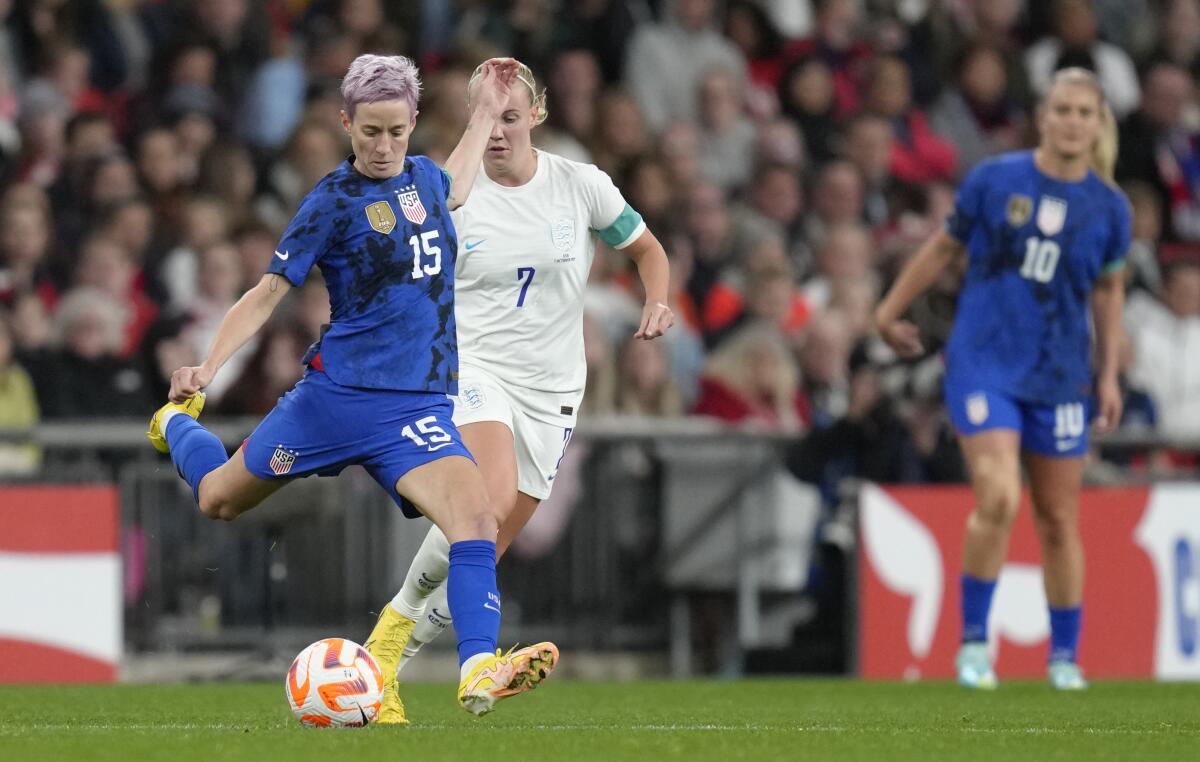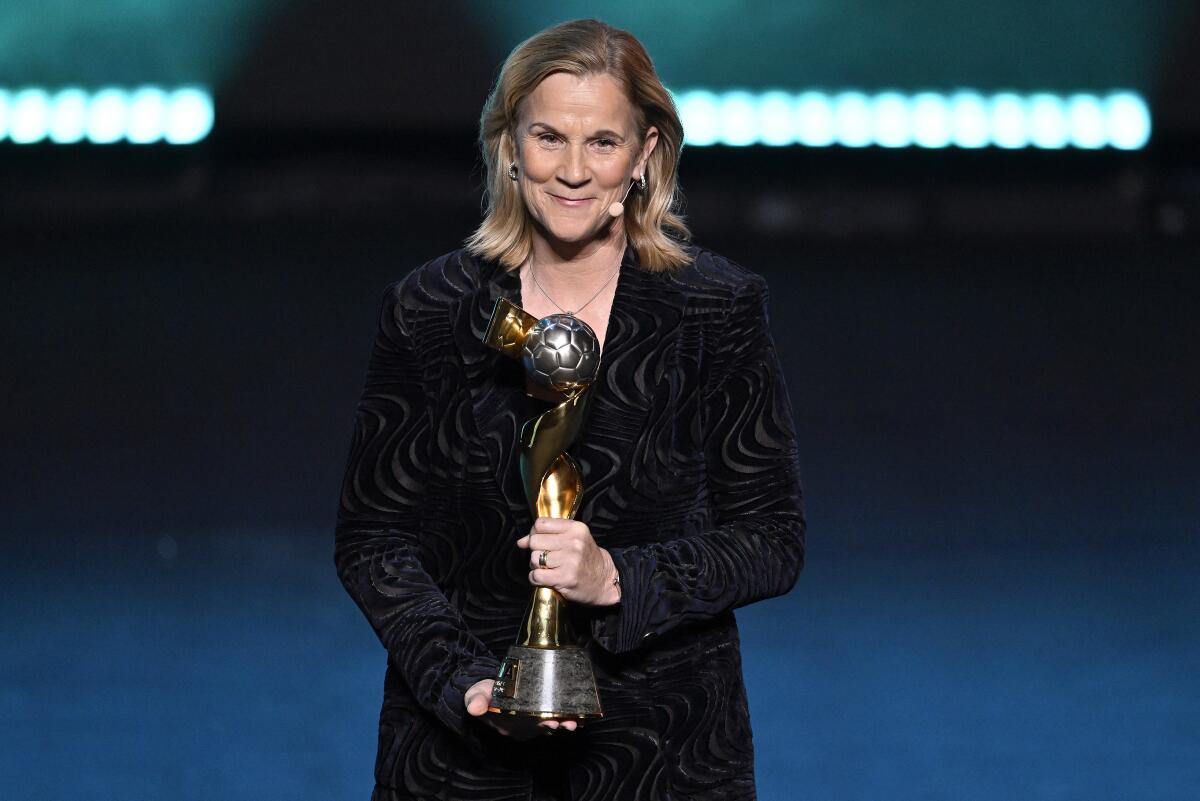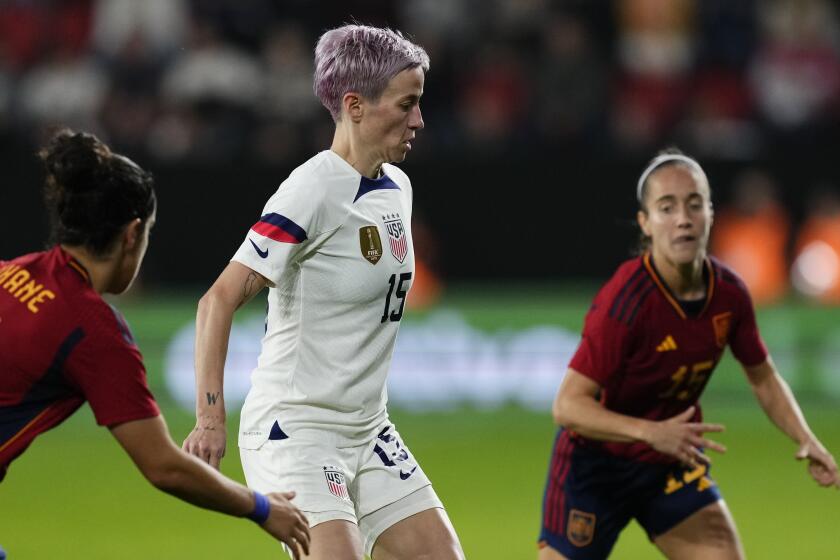U.S. women’s soccer team to face Vietnam, Netherlands at next year’s World Cup

- Share via
The field for next summer’s Women’s World Cup will be the largest in history with 32 countries, double the number invited to the 2011 tournament. At least six of those teams will be playing in the competition for the first time, among them Vietnam, which learned Saturday it would face the top-ranked U.S. in its World Cup debut in July.
Talk about being careful what you wish for.
“The fact that they’re in the tournament means that they’re a good team,” U.S. coach Vlatko Andonovski said of Vietnam, a team the U.S. has never faced. “The unknown is actually a challenge for us.”
The Americans, who will be chasing a record third consecutive World Cup title, will also play the Netherlands and the winner of a three-way February playoff involving Cameroon, Thailand and Portugal in group play. The monthlong competition, to be co-hosted by Australia and New Zealand, will kick off July 20 in Auckland and in Sydney.
The U.S. Women’s National Team loses to Spain 2-0 and drops consecutive matches for the first time since the 2017 SheBelieves Cup.
“We started preparing for the World Cup a long time ago,” said Andonovski, who will be coaching in the tournament for the first time. “But now when we know the opponents, it’s actually digging deep, getting into details and it’s not just preparing for the World Cup. We’re preparing for the opponents as well.”
The Americans never trailed in the 2019 tournament, winning all seven matches and running their unbeaten streak in World Cup play to 17 games, dating to the group-play finale in 2011. But the rest of the world might be catching up. The Americans lost back-to-back games in England and Spain this month, their first losing streak since 2017. And they have just a bronze medal to show from their last two trips to the Olympic Games.
“We have a lot of work to do in the next year,” midfielder Lindsey Horan said. “We’re coming off these two games against England and Spain and you see the competitiveness, how the game is changing and how these teams are evolving. We need to learn and grow from these games. We have to adapt and develop this style that we’re going to play in the World Cup.”
The draw, held Saturday night in Auckland, was particularly soft for the No. 1 U.S., which must finish in the top two in its group to advance to the knockout rounds. The Americans will face only one team — the Netherlands, at No. 8 — ranked in the world’s top 22 by FIFA. And the only game the U.S. lost against teams it could face in group play came 31 years ago against the Dutch.

More recently the Americans beat the Netherlands 2-0 in the last World Cup final, then played it to a draw in the Tokyo Olympics quarterfinal before advancing to the semifinals on penalty kicks.
“Even though we played them in the Olympics, we played them in the World Cup, I don’t see this as a rematch,” Andonovski said. “We are bringing a different group. They are going to have a slightly different lineup as well. So it’s not going to be a rematch.”
The draw was also favorable for the U.S. geographically. Next summer’s tournament will be the first Women’s World Cup played in two countries, with the 64 games spread among five cities and six stadiums in Australia and four cities and stadiums in New Zealand. However, the U.S. will play two of its three group-play matches in Auckland, the other one 300 miles away in Wellington.
Canada, the reigning Olympic champion, will travel nearly 4,000 miles for its three group-play games against Australia, Ireland and Nigeria. Fourth-ranked England, the European champion, was paired with No. 15 China, No. 18 Denmark and the winner of a playoff involving Senegal, Haiti and Chile, none of whom have played in a World Cup, while No. 2 Sweden, the last team to beat the U.S. in a World Cup match, was grouped with South Africa, Italy and Argentina.
Cristian Arango scored in stoppage time and LAFC advanced to the Western Conference final in the MLS Cup Playoffs with a 3-2 win over the Galaxy.
Third-ranked Germany was grouped with Morocco — another World Cup debutante — Colombia and No. 17 South Korea.
“This will be the most competitive Women’s World Cup in history,” said Jill Ellis, who coached the U.S. in the last two tournaments and never lost a World Cup game.
FIFA, the governing body for global soccer, said a record 1.2 billion people watched the 2019 Women’s World Cup on TV, with the final between the U.S. and the Netherlands drawing more than 82 million viewers. But broadcasters fear poor ratings next summer since many of the matches will be played before dawn or in the early morning hours in Europe and North America.
2023 Women’s World Cup groups
Group A: New Zealand, Norway, Philippines, Switzerland
Group B: Australia, Ireland, Nigeria, Canada
Group C: Spain, Costa Rica, Zambia, Japan
Group D: England; winner of playoff between Senegal, Haiti and Chile; Denmark; China
Group E: U.S., Vietnam, Netherlands, winner of playoff between Cameroon, Thailand and Portugal
Group F: France, Jamaica, Brazil, winner of playoff between Taiwan-Paraguay and Papua New Guinea-Panama
Group G: Sweden, South Africa, Italy, Argentina
Group H: Germany, Morocco, Colombia, South Korea









